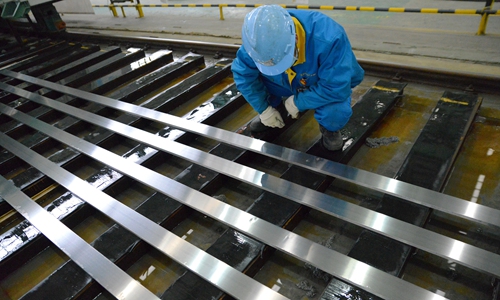
An employee at a steel manufacturing company in Wuxi, East China's Jiangsu Province, works on stainless steel products for export to New Zealand. The batch of over 300 products will be delivered by the end of January. Photo: cnsphoto
Chinese companies are ramping up efforts on raw material processing and export cooperation with local business partners in Indonesia, a major global supplier of nonferrous metals, including nickel and aluminum, in a bid to help Indonesia achieve industry upgrading, while securing adequate metal supplies amid growing domestic demand from China's electric battery market, the largest in the world.
Such efforts came as Indonesia plans to stop raw material exports as part of an effort to attract investment into its resource processing industry and improve Indonesia's external trade balance, according to media reports.
While Indonesia's move drew opposing voices from members of the EU, another market that is heavily reliant on the country's raw material output, Chinese companies have been actively responding to the call by expanding joint cooperation in the advanced raw material processing industry in the Southeast Asian country, which will help lift bilateral trade to a new high, industry insiders said.
Chengtun Mining, an industry conglomerate based in Xiamen, East China's Fujian Province, said in a recent public statement that it plans to establish a new company with Indonesia's Extension in the country, with initial registered capital of about $1 million.
The joint project is intended to process and export intermediate products related to nickel with Chengtun's smelting technologies and funding, a source at Chengtun Mining told the Global Times on Monday, signaling that the company's output, as processed products, will not be included in the trade ban.
Construction work on the project will start next year and is expected to be completed in June or July 2023, with designed production capacity of about 40,000 tons of nickel-related products, the source said, adding that capacity utilization will be expanded in the future.
"Once put into production, our products will be for all markets, but we may prioritize exports to the Chinese market should there be demand," he said.
Another Chinese company, Huayou Cobalt, said this month that it has begun trial output at some production lines in Indonesia. The project is designed to produce 60,000 tons of nickel-related products and other metals per year.
Indonesia is China's largest source of ferronickel imports, accounting for about 84 percent of China's total ferronickel imports. From January to October, the import volume of ferronickel from Indonesia reached 2.61 million tons, a year-on-year increase of 21.13 percent.
Cooperation between Chinese companies and local Indonesian companies can help Indonesia improve its raw material smelting and processing levels and production capacity, and increase the added value of products, Zhou Shijian, a former vice president of the China Chamber of Commerce of Metals, Minerals & Chemicals Importers and Exporters, told the Global Times on Monday.
The cooperation will also circumvent the restrictions on the export of Indonesian raw materials, Zhou noted.
Ternary power batteries for new-energy vehicles are expected to become the biggest driving force for nickel demand in the future, which would make China a major user of Indonesian metals.
Other corresponding cooperation is also expected to generate fruitful outcomes in the near future, including the production of alumina.
China Hongqiao Group told the Global Times on Monday that the progress of the second phase of its alumina plant in Indonesia is going smoothly.
"Our goal is to reach the designed production capacity in 2022 and achieve full production within the year," the company said, referring to the announcement they made in the Indonesian project syndicate in 2019.




